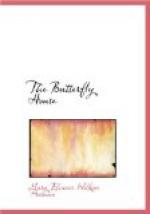Annie Eustace came across the street, and sat with
her. Annie was not little. Although slender,
she was, in fact, quite tall and wide shouldered and
there was something about her which seemed to justify
the use of the diminutive adjective. Possibly
it was her face, which was really small and very pretty,
with perfect cameo-like features and an odd, deprecating,
almost painfully humble expression. It was the
face of a creature entirely capable of asking an enemy’s
pardon for an injury inflicted upon herself.
In reality, Annie Eustace had very much that attitude
of soul. She always considered the wrong as her
natural place, and, in fact, would not have been comfortable
elsewhere, although she suffered there. And yet,
little Annie Eustace was a gifted creature. There
was probably not a person in Fairbridge who had been
so well endowed by nature, but her environment and
up-bringing had been unfortunate. If Annie’s
mother had lived, the daughter might have had more
spirit, but she had died when Annie was a baby, and
the child had been given over to the tyranny of two
aunts, and a grandmother. As for her father, he
had never married again, but he had never paid much
attention to her. He had been a reserved, silent
man, himself under the sway of his mother and sisters.
Charles Eustace had had an obsession to the effect
that the skies of his own individual sphere would
fall to his and his child’s destruction, if
his female relatives deserted him, and that they had
threatened to do, upon the slightest sign of revolt.
Sometimes Annie’s father had regarded her wistfully
and wondered within himself if it were quite right
for a child to be so entirely governed, but his own
spirit of yielding made it impossible for him to realise
the situation. Obedience had been little Annie
Eustace’s first lesson taught by the trio, who
to her represented all government, in her individual
case.
Annie Eustace obeyed her aunts, and grandmother (her
father had been dead for several years), but she loved
only three,—two were women, Margaret Edes
and Alice Mendon; the other was a man, and the love
was not confessed to her own heart.
This afternoon Annie wore an ugly green gown, which
was, moreover, badly cut. The sleeves were too
long below the elbow, and too short above, and every
time she moved an arm they hitched uncomfortably.
The neck arrangement was exceedingly unbecoming, and
the skirt not well hung. The green was of the
particular shade which made her look yellow.
As she sat beside Margaret and embroidered assiduously,
and very unskilfully, some daisies on a linen centre-piece,
the other woman eyed her critically.
“You should not wear that shade of green, if
you will excuse my saying so, dear,” she remarked
presently.
Annie regarded her with a charming, loving smile.
She would have excused her idol for saying anything.
“I know it is not very becoming,” she
agreed sweetly.
“Becoming,” said Margaret a trifle viciously.
She was so out of sorts about her failure to secure
Lydia Greenway that she felt a great relief in attacking
little Annie Eustace.




